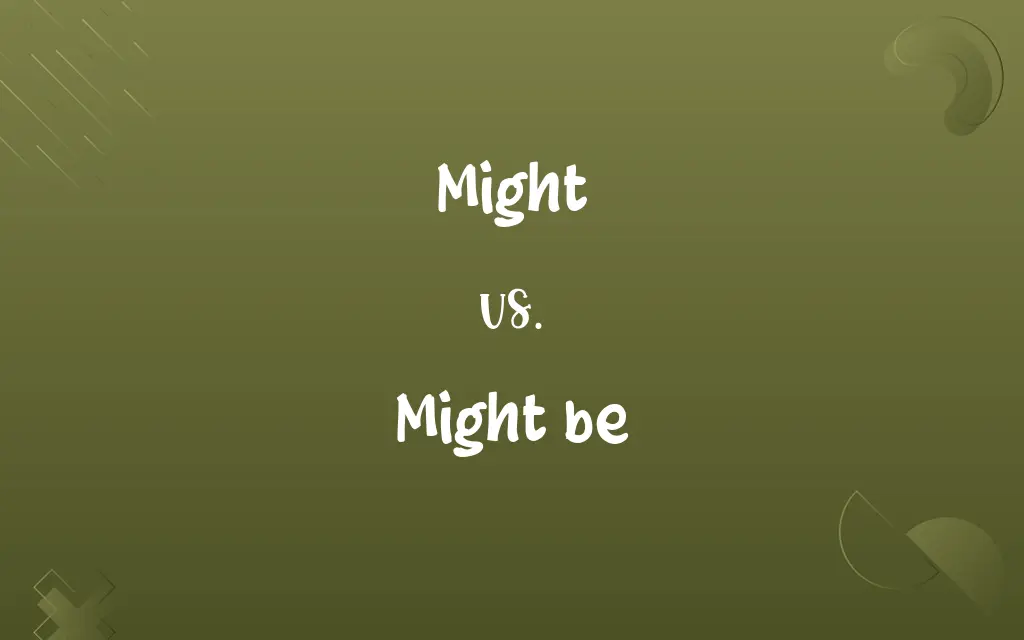Might vs. Might be: Know the Difference

By Shumaila Saeed || Published on February 8, 2024
'Might' expresses possibility or potential ability; 'might be' specifically suggests uncertainty or speculation about a current condition or situation.

Key Differences
'Might' is a modal verb used to indicate a possibility, potential, or ability in a situation. It is often used to express a lower degree of certainty or likelihood. 'Might be,' on the other hand, is a phrase that combines 'might' with the verb 'be,' and is used to speculate about a current state or condition, reflecting uncertainty.
Shumaila Saeed
Feb 08, 2024
In usage, 'might' can convey a sense of something that could potentially happen or an ability someone possesses. It is versatile and can be used in various contexts. 'Might be,' however, is more specific and is used to suggest that something is possibly true at the present moment. It is less about ability and more about the likelihood of a current situation.
Shumaila Saeed
Feb 08, 2024
The context where 'might' is used often involves hypothetical situations, potential actions, or abilities. For example, saying "She might go to the party" suggests that there is a possibility of her going to the party, but it's not certain. In contrast, 'might be' is used in contexts where the speaker is unsure about a present condition, such as in "She might be at the party," which implies uncertainty about her current presence at the party.
Shumaila Saeed
Feb 08, 2024
Grammatically, 'might' is flexible and can be followed by various verbs to indicate different possibilities or abilities. 'Might be' is more restrictive as it is always followed by 'be,' limiting its use to expressing uncertainty about states or conditions. For instance, "He might solve the problem" indicates a potential ability, while "He might be solving the problem" suggests uncertainty about what he is doing at the moment.
Shumaila Saeed
Feb 08, 2024
'Might' can also imply a polite suggestion or a less direct way of expressing an opinion or desire, adding softness to a statement. 'Might be' is less about politeness or suggestion and more focused on expressing a conjecture about a present situation. For example, "You might want to check that" is a polite suggestion, whereas "It might be broken" expresses a possibility about the current state of something.
Shumaila Saeed
Feb 08, 2024
ADVERTISEMENT
Comparison Chart
Usage
Indicates possibility, potential, or ability
Suggests uncertainty about a current state
Shumaila Saeed
Feb 08, 2024
Context
Hypothetical, potential actions, abilities
Present situations, current conditions
Shumaila Saeed
Feb 08, 2024
Grammatical Flexibility
Followed by various verbs
Always combined with the verb 'be'
Shumaila Saeed
Feb 08, 2024
Implication
Can imply politeness or indirect suggestion
Focuses on conjecture, less about politeness
Shumaila Saeed
Feb 08, 2024
ADVERTISEMENT
Might and Might be Definitions
Might
Implies a hypothetical scenario.
They might travel if they save enough money.
Shumaila Saeed
Jan 24, 2024
Might be
Suggests uncertainty about the present.
She might be working right now.
Shumaila Saeed
Jan 24, 2024
Might be
Used for speculating about a situation.
It might be the right solution.
Shumaila Saeed
Jan 24, 2024
ADVERTISEMENT
Might be
Expresses a tentative assumption.
He might be the person we're looking for.
Shumaila Saeed
Jan 24, 2024
Might be
Implies conjecture about current conditions.
The weather might be changing.
Shumaila Saeed
Jan 24, 2024
Might
(uncountable) Physical strength or force.
He pushed with all his might, but still it would not move.
Shumaila Saeed
Jan 22, 2024
Might
(auxiliary) Used to indicate conditional or possible actions.
I might go to the party, but I haven't decided yet.
Shumaila Saeed
Jan 22, 2024
Might
(auxiliary) may Used to indicate permission in past tense.
He asked me if he might go to the party, but I haven't decided yet.
Shumaila Saeed
Jan 22, 2024
Might
(auxiliary) may Used to indicate possibility in past tense.
I thought that I might go the next day.
Shumaila Saeed
Jan 22, 2024
Might
Used to indicate a desired past action that was not done.
Hey man, you might have warned me about the thunderstorm.
Shumaila Saeed
Jan 22, 2024
Might
(auxiliary) Even though.
I might be in a wheelchair, but I still want to be treated as a lady.
Shumaila Saeed
Jan 22, 2024
Might
(auxiliary) Used in polite requests for permission
Might I take the last biscuit?
Shumaila Saeed
Jan 22, 2024
Might
Used to express certainty.
Yeah, I think we might need something a bit sturdier.
Shumaila Saeed
Jan 22, 2024
Might
Force or power of any kind, whether of body or mind; energy or intensity of purpose, feeling, or action; means or resources to effect an object; strength; force; power; ability; capacity.
What so strong,But wanting rest, will also want of might?
Thou shalt love the Lord thy God with all thine heart, and with all thy soul, and with all thy might.
Shumaila Saeed
Jan 22, 2024
Repeatedly Asked Queries
Can 'might' suggest politeness?
Yes, 'might' can be used to make polite suggestions or indirect statements.
Shumaila Saeed
Feb 08, 2024
Is 'might be' about present or future situations?
'Might be' typically refers to present situations or states.
Shumaila Saeed
Feb 08, 2024
When is "might be" used to describe a future possibility?
"Might be" can be used to discuss future possibilities when there is uncertainty about the outcome. For instance, "It might be sunny tomorrow."
Shumaila Saeed
Feb 08, 2024
What does 'might' convey?
'Might' conveys possibility, potential ability, or hypothetical scenarios.
Shumaila Saeed
Feb 08, 2024
Is "might be" used to express conditional statements?
Yes, "might be" can be used in conditional sentences to convey possible outcomes, like "If he arrives on time, he might be able to join us."
Shumaila Saeed
Feb 08, 2024
Is "might be" used in casual conversations as well?
Yes, "might be" is suitable for both formal and casual conversations when discussing possibilities or uncertainties.
Shumaila Saeed
Feb 08, 2024
Can "might be" also imply doubt or skepticism?
Yes, depending on the context, "might be" can be used to express doubt or skepticism about the accuracy of a statement.
Shumaila Saeed
Feb 08, 2024
What is the past tense form of "might"?
The past tense of "might" is "might have." For instance, "He might have finished his homework."
Shumaila Saeed
Feb 08, 2024
How is 'might be' used?
'Might be' is used to express uncertainty or speculation about current conditions.
Shumaila Saeed
Feb 08, 2024
Are there other variations of "might be" with different meanings?
"Might have been" and "might not be" are variations of "might be" with distinct meanings related to past possibilities and impossibilities.
Shumaila Saeed
Feb 08, 2024
Is "might" commonly used in everyday conversation?
Yes, "might" is a common word in both written and spoken English.
Shumaila Saeed
Feb 08, 2024
Is "might be" commonly used in formal writing?
"Might be" is suitable for formal writing when discussing possibilities or uncertainties in a respectful manner.
Shumaila Saeed
Feb 08, 2024
Can "might be" be replaced with "may be" in most cases?
Yes, "might be" and "may be" are often interchangeable when expressing possibilities, but the choice may depend on preference or context.
Shumaila Saeed
Feb 08, 2024
Does "might" always indicate uncertainty?
While "might" often suggests uncertainty, it can also be used to express a stronger degree of possibility depending on the context.
Shumaila Saeed
Feb 08, 2024
Is "might" used in conditional statements?
Yes, "might" is often used in the condition of a hypothetical situation, like "If it rains, we might stay indoors."
Shumaila Saeed
Feb 08, 2024
Can "might" be used in the negative form to express impossibility?
Yes, in the negative form, "might not" indicates that something is not likely or possible. For example, "I might not be available tomorrow."
Shumaila Saeed
Feb 08, 2024
Share this page
Link for your blog / website
HTML
Link to share via messenger
About Author
Written by
Shumaila SaeedShumaila Saeed, an expert content creator with 6 years of experience, specializes in distilling complex topics into easily digestible comparisons, shining a light on the nuances that both inform and educate readers with clarity and accuracy.









































































